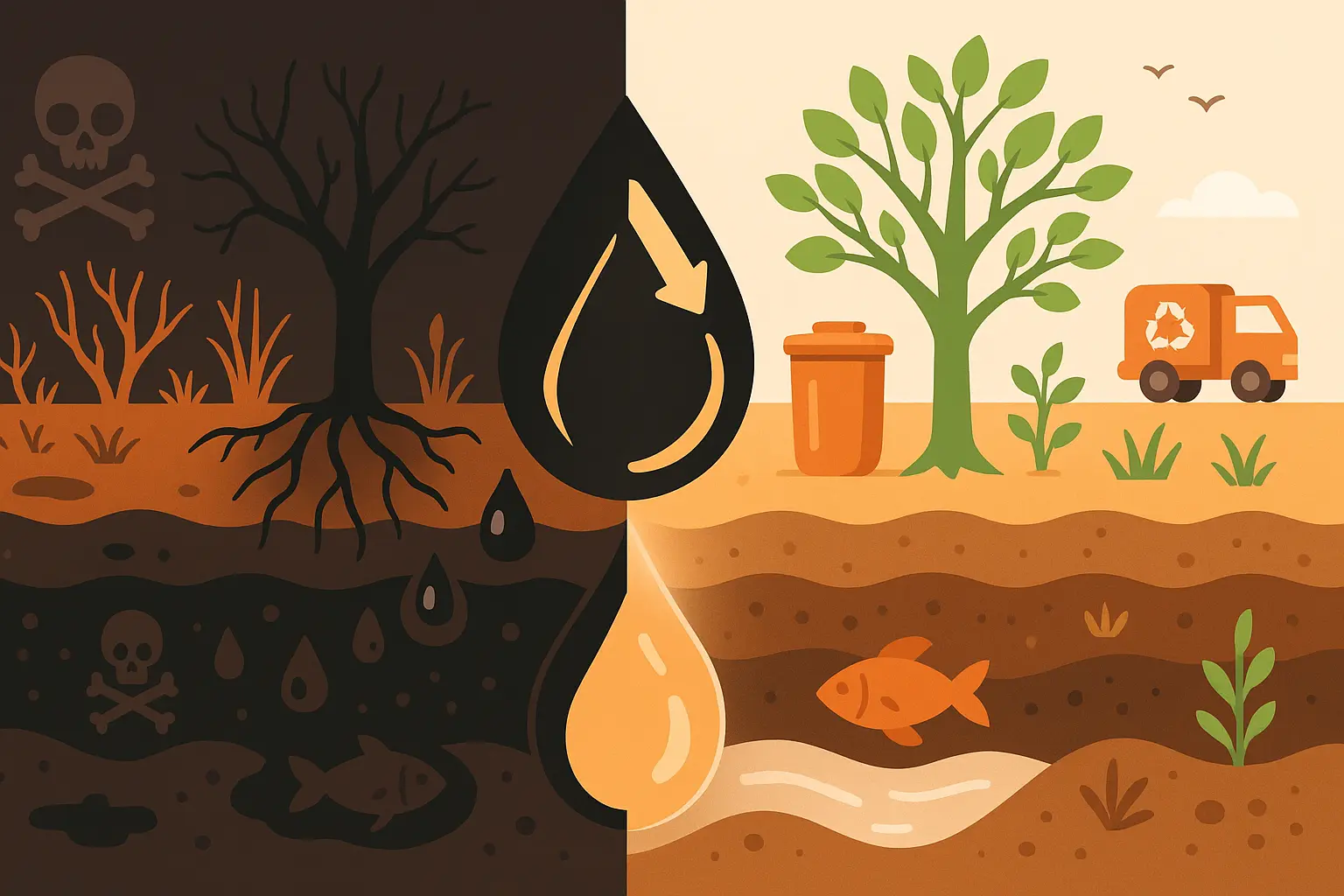Introduction to Cooking Oil
Proper cooking oil handling is essential for protecting both your home and the environment. Whether you’re using vegetable oil, canola oil, or olive oil, leftover cooking oil can cause significant damages to the planet if not handled correctly. When used cooking oil is disposed of improperly, it can lead to soil contamination, which disrupts plant life and can even affect the food chain. Water pollution is another major concern, as used oil that seeps into the ground can eventually reach local waterways, threatening aquatic life and the overall health of the ecosystem.
To prevent these risks, it’s important to understand the most environmentally friendly ways to dispose of cooking oil. Recycling used cooking oil is a great option—many recycling centers now accept used oil and convert it into biodiesel, a clean-burning fuel that helps reduce waste and environmental impact. By choosing responsible cooking oil removal methods, you help protect the soil, water, and plant life in your community, ensuring a healthier environment for everyone.
Key Takeaways
- Dumping cooking oil harms the environment by causing contamination, affecting plant life, and leading to water pollution.
- Proper disposal methods include using a disposable bin, recycling cooking oil at designated centers, and composting tiny amounts of vegetable oil.
- Common mistakes to avoid include pouring used oil down the drain, mixing it with other waste, and ignoring local disposal regulations.
Why You Should Never Dump Cooking Oil in the Ground
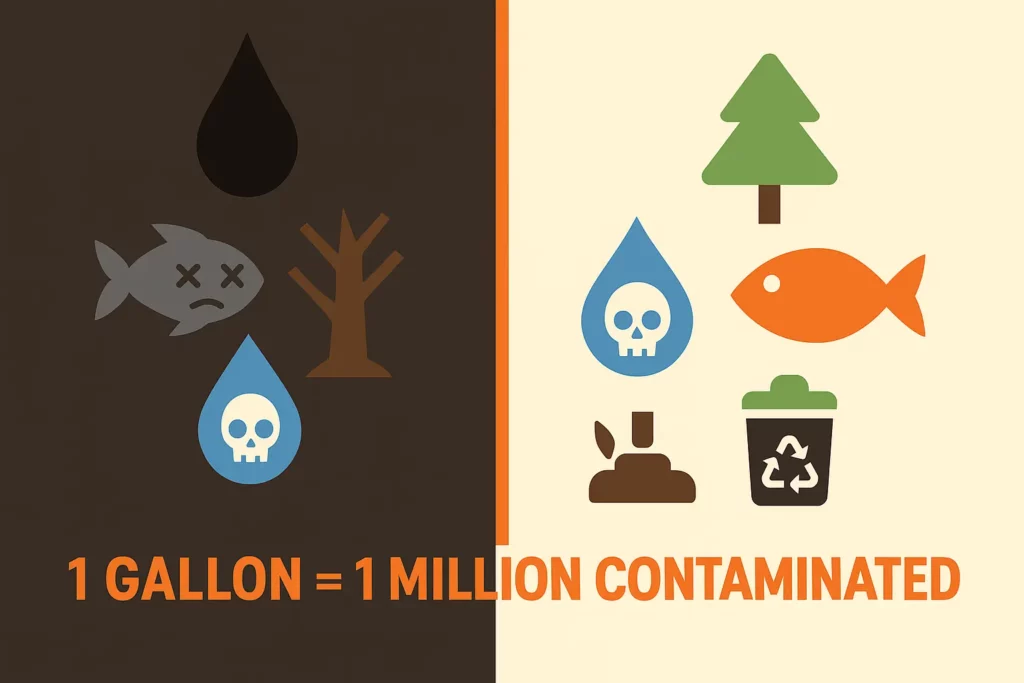
Dumping cooking oil in the ground might seem harmless at first glance, but it poses significant environmental impacts. The ramifications extend far beyond your backyard, affecting ecosystems and contributing to broader environmental implications. When used cooking oil seeps into the soil, it can lead to soil contamination, harming plant life and potentially spreading to local water sources.
Improper disposal of cooking oil can create a cascade of negative effects. Dumping used oil on the ground can attract bugs, which may lead to further health and sanitation issues. From contamination to water pollution, the impact is far-reaching. Additionally, the release of cooking oil into the environment can contribute to air quality issues through harmful gas emissions.
Soil Contamination
One of the primary risks of dumping cooking oil on the ground is contamination. When used oil seeps into the soil, it creates a barrier that blocks the flow of oxygen and nutrients essential for plant growth. Fat from cooking oil also contributes to soil contamination and should not be disposed of in compost or soil, as it can cause further blockages and pollution. This barrier can be particularly detrimental to tree health, restricting their access to vital resources.
Additionally, adding cooking oil to a compost pile in large amounts can hinder the composting process by affecting airflow. It’s clear that improper disposal practices can lead to severe environmental damage, making it crucial to adopt proper disposal methods for cooking oil.
Harm to Plant Life
Dumping cooking oil in gardens or on plants can impede plant growth and overall health. Cooking oil can coat plant roots, inhibiting their ability to absorb water and essential nutrients. While small quantities of vegetable oil might not kill plants outright, they make it harder for plants to thrive. Mixing cooking oil with food scraps in compost can further disrupt plant health and should be avoided.
In more severe cases, such as with larger amounts of oil, the damage can be extensive enough to kill entire trees. The environmental damages caused by improper disposal of cooking oil underscores the need for eco-friendly practices to protect our plant life.
Water Pollution
When cooking oil seeps into the ground, it doesn’t just stay there. It can eventually reach local waterways, leading to significant water pollution. Contaminated water poses a threat to aquatic life and can disrupt entire ecosystems. Improper disposal of cooking oil can also contribute to sewer blockages, which may result in overflows of raw sewage into the environment, causing further environmental and health hazards. Oil pollution harms aquatic ecosystems by disrupting reproductive cycles in fish and reducing biodiversity. Moreover, it can jeopardize drinking water supplies, posing health risks to humans.
The presence of oil in water sources can be particularly harmful to aquatic life, as it creates a film on the water’s surface that blocks sunlight and reduces oxygen levels. This can suffocate fish and other marine animals, leading to a decline in biodiversity. Contaminated water can also lead to fatal poisoning in wildlife. The broader environmental harm caused by water pollution highlights the importance of proper disposal methods.
It’s evident that improper disposal of cooking oil can lead to severe environmental consequences. Recognizing these impacts allows us to take steps to mitigate them and adopt more sustainable practices.
Safe Storage and Handling of Used Cooking Oil
Storing and handling used cooking oil safely is a key step in proper disposal and preventing environmental damage. After cooking, allow the oil to cool completely before transferring it to a disposable container, such as an empty milk carton or a sturdy plastic bottle. Make sure the container is tightly sealed to prevent leaks or spills, which could potentially leak and cause messes or hazards in your home.
Keep the container in a safe place, away from heat sources, children, and pets, to avoid accidents. When handling used cooking oil, consider wearing protective gloves and eyewear to prevent skin and eye irritation. Always check local guidelines for proper handling of used oil, as some areas have specific collection programs or regulations to follow.
Never pour used cooking oil down the drain, as this can lead to clogs and sewer backups, resulting in fines and environmental damage. By following these safe storage and handling practices, you can ensure that your used cooking oil is disposed of properly and responsibly, minimizing risks to your home and the environment.
Proper Disposal Methods for Cooking Oil
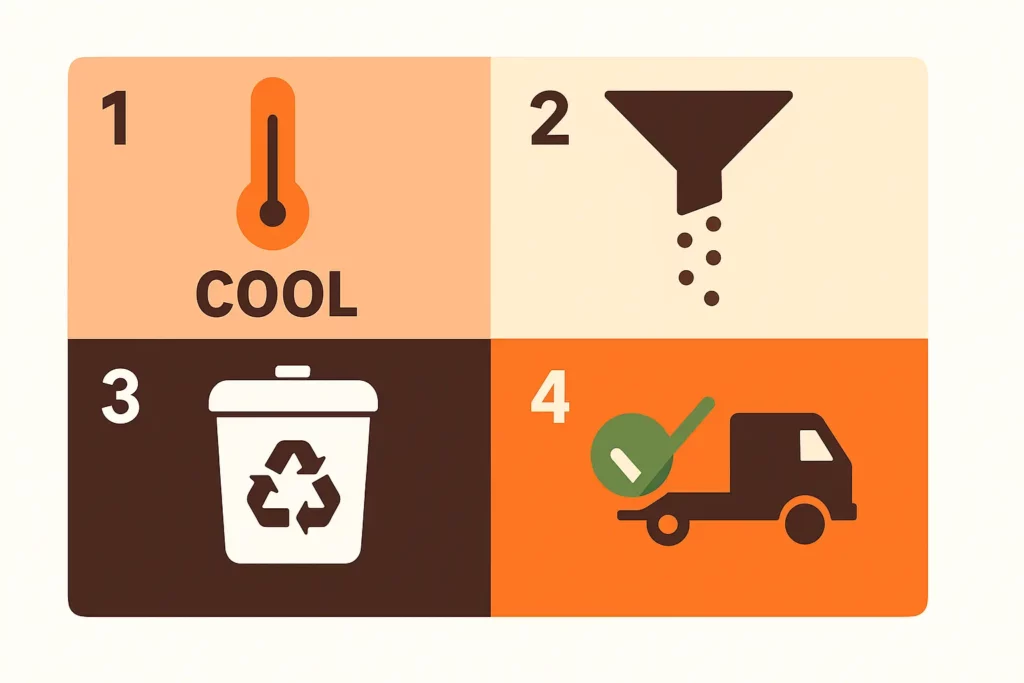
Minimizing environmental harm involves using safe and eco-friendly disposal methods for used cooking oil. Simple practices, such as using a disposable container or recycling, can make a significant difference.
Here are some detailed methods to help you dispose of cooking oil properly. It is important to properly dispose of oil to prevent environmental harm and avoid plumbing issues. For small amounts of oil, absorbent materials can be used to soak up the oil before disposal, making the process cleaner and safer.
Use a Disposable Container
One of the easiest ways to dispose of cooking oil is by using a disposable container. Follow these steps:
- Let the used oil cool for at least an hour before handling it.
- Once cooled, pour the used oil into a durable, sealable container, such as a plastic bottle or milk carton.
- Ensure the container is tightly sealed to prevent leaks. It is best to throw small amounts of cooking oil in the trash.
For tiny amounts of oil, you can use cat litter, a paper towel, or paper towels to absorb the oil before placing it in the trash. Paper towels used to wipe pans or surfaces should also be discarded in the trash, not down the drain, to prevent plumbing issues. While plastic bags can be used for storage, they may leak, so sturdier containers are recommended.
After sealing the container tightly, place it in your kitchen trash and take the trash out immediately to avoid any potential mess. This method ensures that the used oil is contained and disposed of safely, minimizing environmental impact.
Recycle Cooking Oil
Recycling used cooking oil is one of the most environmentally friendly disposal methods. Many recycling centers accept used cooking oil and can convert it into biodiesel, a sustainable fuel alternative. Additionally, used cooking oil can be converted into biogas through anaerobic digestion, which can power vehicles and generate electricity. Collect your used oil in a sealable container, like a gallon milk jug, and take it to a local recycling center.
Additionally, some local businesses and restaurants may offer recycling services for cooking oil. Contacting them can provide more options for proper disposal and ensure that your used cooking oil is recycled responsibly. Companies also offer services to collect and recycle used cooking oil from commercial kitchens, making it easier for businesses to comply with environmental regulations. Some recycling programs use automated systems equipped with features like anti-theft valves and sensors to improve safety and efficiency in oil collection. Another innovative use for used cooking oil is its conversion into animal feed after appropriate processing, which provides a sustainable way to repurpose this byproduct.
Composting Small Amounts
For those with a compost pile, small amounts of 100% vegetable cooking oil can be added safely. Ensure the oil has not been used for frying meat or poultry, as this can attract pests and disrupt the composting process. Oil used to cook vegetables is generally safer for composting than oil used to cook meat, as plant-based oils combined with vegetables are less likely to cause issues.
When composting, only add small amounts of oil to avoid attracting pests and ensure proper decomposition. This method allows you to recycle cooking oil in an environmentally safe way, contributing to a healthier environment.
Alternative Uses for Used Cooking Oil
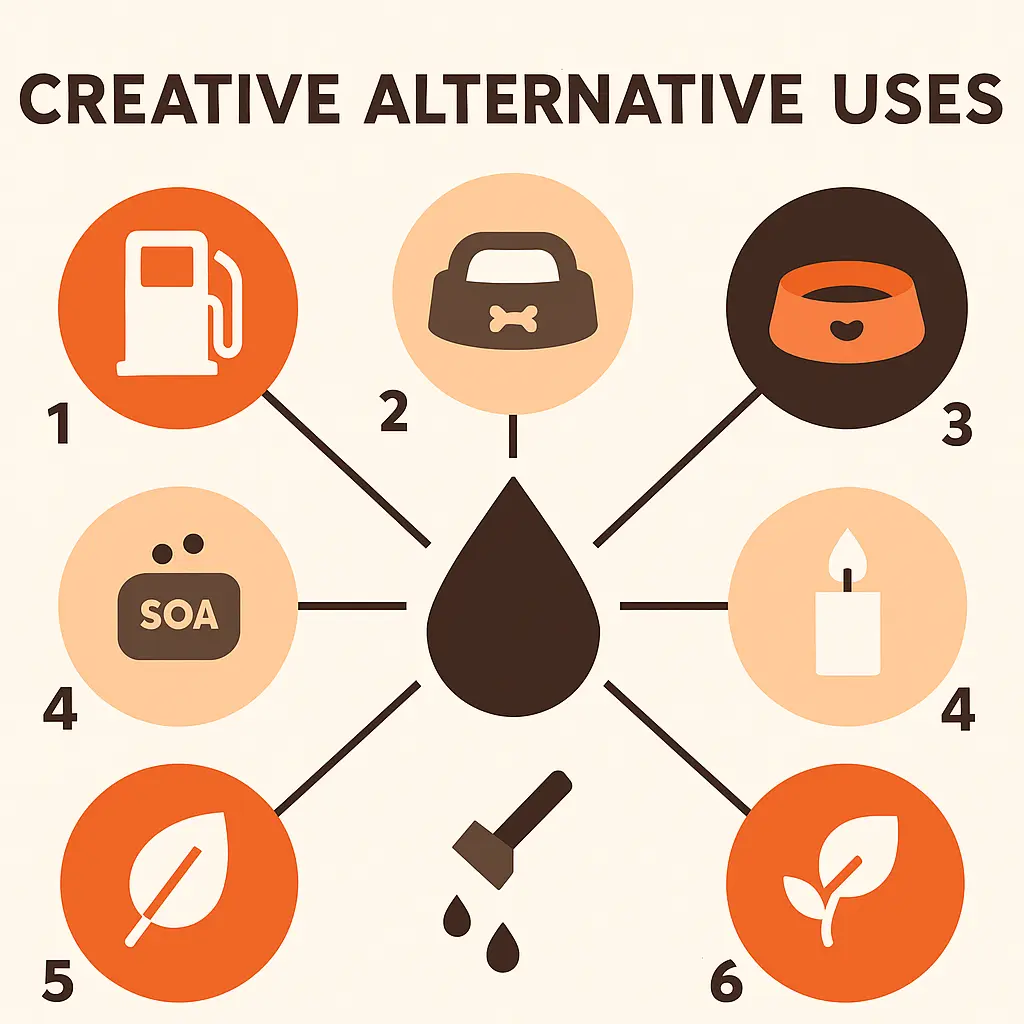
Instead of discarding used cooking oil, consider repurposing it for various creative and practical uses. These alternative methods not only reduce waste but also provide unique benefits related to cooking oils.
Here are some innovative uses. Storing used cooking oil in a glass jar is a practical way to keep it for reuse or safe disposal.
Reuse Cooking Oil
Used cooking oil can be reused in cooking, provided it is free from food particles before storing. Here are some key points to consider:
- Cooking oil can typically be reused 2 to 4 times before it becomes unsuitable.
- The smoke point of the oil decreases after each use.
- Use the reused oil with caution due to the lowered smoke point.
Store the used oil in a refrigerator to extend its shelf life, keeping it fresh for a few months. Reusing cooking oil in this manner reduces waste and maximizes its utility.
Non-Toxic Insecticide
Used cooking oil can act as a non-toxic insecticide and can also be used as a weed killer. When mixed with water and applied to plants, it suffocates harmful insects, providing an eco-friendly pest control solution.
To use cooking oil as an insecticide, fill a spray bottle with a mixture of water and vegetable oil, and spray it onto the affected plants. This method is effective against soft-bodied insects and environmentally safe.
Making Soap
Another innovative use for used cooking oil is soap making. Through the process of saponification, used cooking oil can be combined with lye to create homemade soap. This not only repurposes the oil but also provides a sustainable and eco-friendly alternative to commercial soap.
Making soap from used cooking oil is a rewarding and practical way to recycle it. It reduces waste and allows you to create a useful product from a byproduct that would otherwise be discarded.
Mistakes to Avoid When Disposing of Cooking Oil
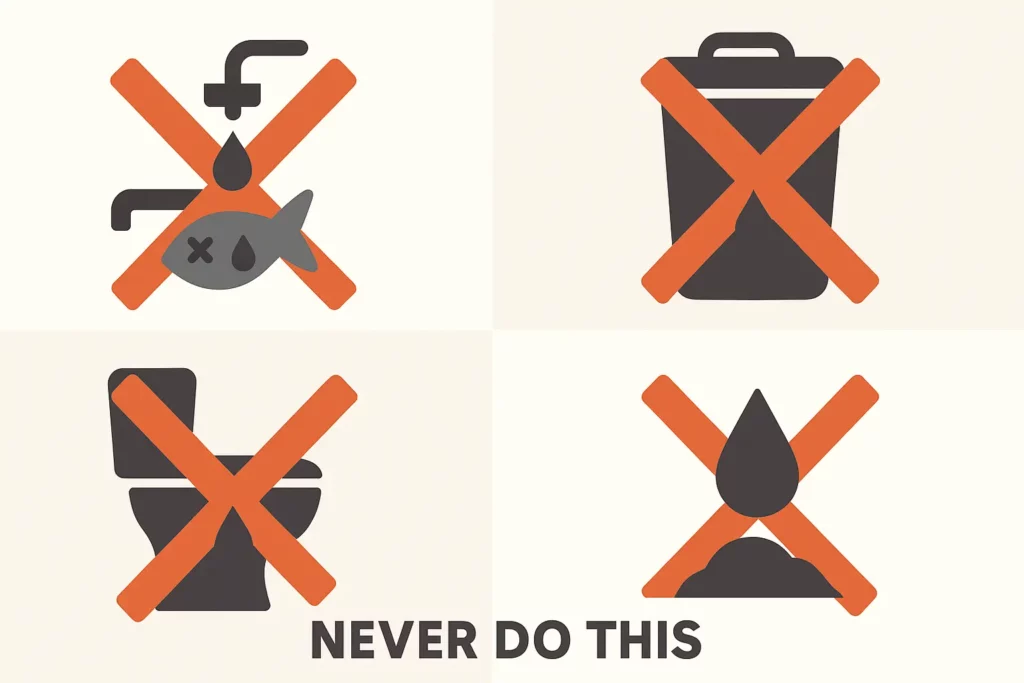
Despite the many proper disposal methods, common mistakes can still occur. These errors can lead to environmental harm and should be avoided in the most environmentally friendly way. Improper disposal of cooking grease is a frequent mistake that can have serious environmental consequences.
Here are some pitfalls to avoid.
Pouring Down the Drain
One of the most common mistakes is pouring cooking oil down the drain. This can cause clogged pipes and sewer backups, leading to costly repairs and plumbing disasters. Additionally, oil can contaminate drinking water sources and oceans when it is poured into the sewer system.
Never dispose of cooking oil down the drain or toilet to avoid these issues. Instead, use proper disposal methods to protect your plumbing and the environment.
Mixing with Waste
Mixing cooking oil with other waste materials can lead to rancid oil, attract pests, and pose fire hazards. Proper containment is crucial to avert these potential risks and environmental impacts. Wiped pans should be thrown in the trash and not rinsed down the sink.
Store cooking oil in a sealable container and dispose of it properly to prevent these issues. For larger quantities of used oil, special disposal methods are necessary, such as recycling, using digesters, or arranging for professional collection services. This practice helps maintain a safe and eco-friendly environment.
Ignoring Rules & Regulations
Ignoring local disposal guidelines can lead to environmental damage and financial penalties. Check local guidelines and adhere to specific regulations to ensure responsible disposal practices.
Regulations and Guidelines for Cooking Oil Disposal
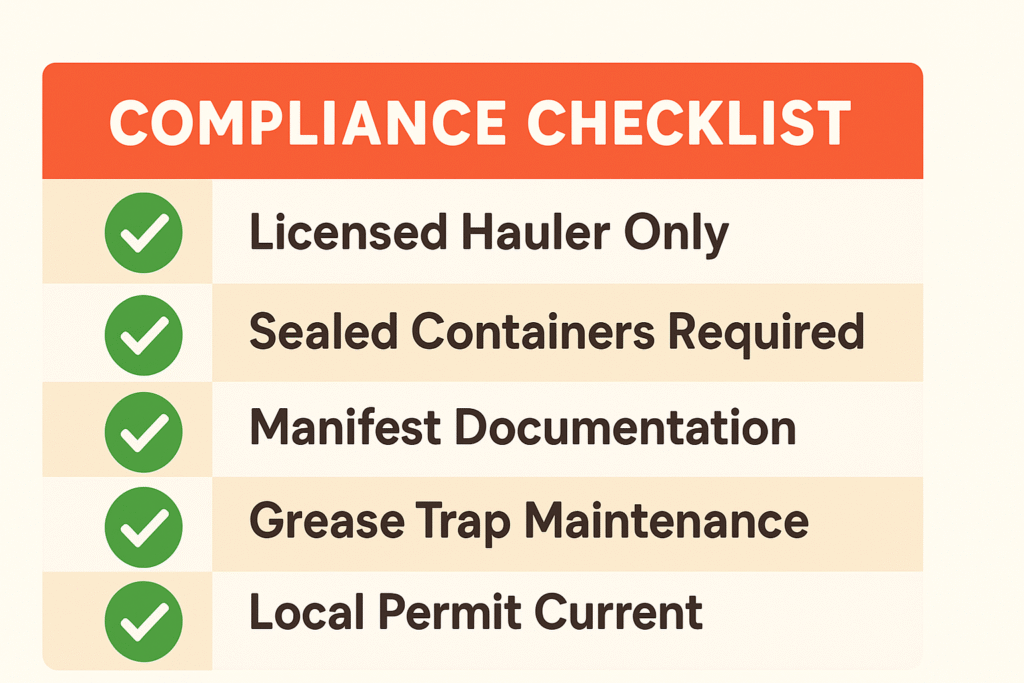
Following regulations and guidelines is crucial for responsible cooking oil disposal. Different areas have specific rules, and failing to adhere to them can result in costly fines and environmental harm. Improper disposal of cooking oil can result in costly fines from local authorities.
Local businesses may also offer recycling services, converting used oil into biodiesel.
Household Regulations
Households should contact their local environmental or waste management department to understand specific cooking oil disposal regulations. Typically, grease traps are not required for residential homes, simplifying the disposal process.
Proper storage and reuse oil can extend the life of used cooking oil.
Commercial Kitchen Requirements
Commercial kitchens have stricter regulations and must have grease traps installed to prevent fats, oils, and grease from clogging the wastewater system. Regular maintenance of these traps is essential to ensure their proper functioning and prevent sewer systems blockages, as part of an effective grease disposal system. Failing to comply with cooking oil disposal regulations can lead to the closure of a business. Additionally, local authorities can issue costly fines if a restaurant is found to improperly dispose of cooking oil, emphasizing the importance of adhering to these regulations.
Summary
Proper disposal of cooking oil is crucial for protecting the environment and preventing damage to ecosystems. From soil contamination and harm to plant life to water pollution, the consequences of improper disposal are significant. By adopting safe disposal methods, such as using disposable containers, recycling, and composting, we can minimize these impacts and contribute to a healthier planet.
Creative alternatives for used cooking oil, such as reusing it for cooking, making soap, or using it as a non-toxic insecticide, provide additional ways to reduce waste and promote sustainability. Avoiding common mistakes and adhering to local guidelines further ensures responsible disposal practices. Let’s commit to making these positive changes and protecting our environment for future generations.

